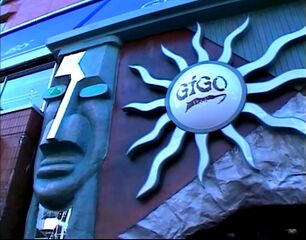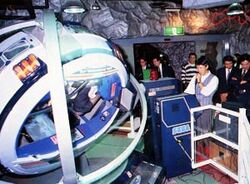Difference between revisions of "Roppongi GiGO"
From Sega Retro
m (→History) |
m (→History) |
||
| Line 12: | Line 12: | ||
Inaugurated with a press event on September 10{{magref|gamemachinejp|437|2}} and opened with the aim of becoming a fixture of Roppongi's adult nightlife, Roppongi GiGO was the first [[GiGO]] center{{magref|segamagjp|7|36}} and the largest urban amusement facility in Japan up to that point in time.{{magref|gamemachinejp|437|11}} Its public opening the following week represented one of Sega's first steps in establishing large scale entertainment centres in prime inner-city locations; the facility's large size, elaborate décor, and themed zones{{intref|Press release: 1994-02-07:Shisetsu-nai inshoku tenpo shirīzu `aisu biru'(Tōkyō Roppongi) hoteru goraku inshoku zōn}} significantly outclassed the [[Hi-Tech Land Sega]] and newer [[Sega World]] locations opened previously in the country. | Inaugurated with a press event on September 10{{magref|gamemachinejp|437|2}} and opened with the aim of becoming a fixture of Roppongi's adult nightlife, Roppongi GiGO was the first [[GiGO]] center{{magref|segamagjp|7|36}} and the largest urban amusement facility in Japan up to that point in time.{{magref|gamemachinejp|437|11}} Its public opening the following week represented one of Sega's first steps in establishing large scale entertainment centres in prime inner-city locations; the facility's large size, elaborate décor, and themed zones{{intref|Press release: 1994-02-07:Shisetsu-nai inshoku tenpo shirīzu `aisu biru'(Tōkyō Roppongi) hoteru goraku inshoku zōn}} significantly outclassed the [[Hi-Tech Land Sega]] and newer [[Sega World]] locations opened previously in the country. | ||
| − | For a time, GiGO maintained a high-profile status and popularity among the clientele of Roppongi,{{ref|https://web.archive.org/web/20210226035808/https://xtrend.nikkei.com/atcl/trn/pickup/15/1008498/102200986/}} generating front-page coverage from [[wikipedia:The Asahi Shimbum|The Asahi Shimbun]] newspaper and strengthening the view of video amusements as a healthy, social form of entertainment;{{ref|https://web.archive.org/web/20210507020538/https://blog.goo.ne.jp/lemon6868/e/c05a21f4c655a617cf9ce433e0651744}} | + | For a time, GiGO maintained a high-profile status and popularity among the clientele of Roppongi,{{ref|https://web.archive.org/web/20210226035808/https://xtrend.nikkei.com/atcl/trn/pickup/15/1008498/102200986/}} generating front-page coverage from [[wikipedia:The Asahi Shimbum|The Asahi Shimbun]] newspaper and strengthening the view of video amusements as a healthy, social form of entertainment;{{ref|https://web.archive.org/web/20210507020538/https://blog.goo.ne.jp/lemon6868/e/c05a21f4c655a617cf9ce433e0651744}} women regularly accounted for about half of the facility's customer base.{{ref|https://web.archive.org/web/20210507020538/https://blog.goo.ne.jp/lemon6868/e/c05a21f4c655a617cf9ce433e0651744}} Celebrities made appearances at the venue, both locally, as a result of its close proximity to [[wikipedia:TV Asahi|TV Asahi]]'s studios, and from around the world - [[Michael Jackson]] visited the site in December 1992,{{ref|https://mdshock.com/2020/12/08/michael-jackson-visits-sega-in-japan-december-1992/}} alongside other notable figures including [[wikipedia:Megumi Hayashibara|Megumi Hayashibara]]{{magref|bemega|1994-05|63}} and [[wikipedia:Christian Fittipaldi|Christian Fittipaldi]].{{fileref|Roppongi_GiGO_Christian_Fittipaldi.mp4}} |
In the months following its opening, it became the debut location of the four-player ''[[Virtua Formula]]'' model,{{magref|gamemachinejp|448|14}} as well as a site for numerous events.{{fileref|Roppongi_GiGO_FV_1995.mp4}} Roppongi GiGO is thought to have lost Sega's involvement sometime after the late 1990s. It continued to operate as a game center in a downsized capacity under the name of Roppongi Vortex,{{ref|https://web.archive.org/web/20010426214157/http://www.st.rim.or.jp/~k-nishi/tgm/roppongi.html}} later closing permanently at the end of 2013.{{ref|http://throwbackjapan.blogspot.com/2014/03/arcade-vortex-roppongi-tokyo.html}} | In the months following its opening, it became the debut location of the four-player ''[[Virtua Formula]]'' model,{{magref|gamemachinejp|448|14}} as well as a site for numerous events.{{fileref|Roppongi_GiGO_FV_1995.mp4}} Roppongi GiGO is thought to have lost Sega's involvement sometime after the late 1990s. It continued to operate as a game center in a downsized capacity under the name of Roppongi Vortex,{{ref|https://web.archive.org/web/20010426214157/http://www.st.rim.or.jp/~k-nishi/tgm/roppongi.html}} later closing permanently at the end of 2013.{{ref|http://throwbackjapan.blogspot.com/2014/03/arcade-vortex-roppongi-tokyo.html}} | ||
Revision as of 11:59, 12 July 2021

|
| Roppongi GiGO |
|---|
| Location: 東京都港区六本木七丁目14番4号 アイビス共同ビル5階, Japan |
| Opened: 1992-09-18[1] |
| Closed: 1998 |
Roppongi GiGO (六本木GiGO) is a former GiGO venue jointly developed by Sega and Ibis, which owned the hotel it was situated in.[1] Located in Roppongi, a district of Tokyo noted for its nightlife, the venue was at one stage the largest urban amusement facility in Japan,[2] initially creating positive results. Sega are thought to have dropped involvement with the center in the late 1990s.
History
Inaugurated with a press event on September 10[3] and opened with the aim of becoming a fixture of Roppongi's adult nightlife, Roppongi GiGO was the first GiGO center[4] and the largest urban amusement facility in Japan up to that point in time.[2] Its public opening the following week represented one of Sega's first steps in establishing large scale entertainment centres in prime inner-city locations; the facility's large size, elaborate décor, and themed zones[5] significantly outclassed the Hi-Tech Land Sega and newer Sega World locations opened previously in the country.
For a time, GiGO maintained a high-profile status and popularity among the clientele of Roppongi,[6] generating front-page coverage from The Asahi Shimbun newspaper and strengthening the view of video amusements as a healthy, social form of entertainment;[7] women regularly accounted for about half of the facility's customer base.[7] Celebrities made appearances at the venue, both locally, as a result of its close proximity to TV Asahi's studios, and from around the world - Michael Jackson visited the site in December 1992,[8] alongside other notable figures including Megumi Hayashibara[9] and Christian Fittipaldi.[10]
In the months following its opening, it became the debut location of the four-player Virtua Formula model,[11] as well as a site for numerous events.[12] Roppongi GiGO is thought to have lost Sega's involvement sometime after the late 1990s. It continued to operate as a game center in a downsized capacity under the name of Roppongi Vortex,[13] later closing permanently at the end of 2013.[14]
Layout
Establishing an organised concept also seen in subsequent GiGO locations, each of Roppongi GiGO's four floors were devoted to specific machines and attractions - the first floor featured video games, including deluxe Virtua Racing and R360 units, the second housed prize redemption, sports games, and a bar,[5] the third featured medal games, and the fourth contained a casino area and karaoke rooms. Customers had to be at least 18 years of age to enter, and 20 to access the fourth floor's casino area.[1]
The floors were featured in segments of the Mega Drive Perfect Video '92~'93 promotional video, with Dream Palace and Royal Ascot machines demoed.
Branding
| Name | Branding | Date |
|---|---|---|
| Roppongi GiGO (六本木GiGO) | GiGO | 1992-09-18[1] |
| Closed | 1998 | |
Videos
Footage from Bad Influence! report on Japan, c. late 1992
Footage of Christian Fittipaldi's visit, 1992
Fighting Vipers tournament in 1995 filmed for Tonight 2
Gallery
Magazine articles
- Main article: Roppongi GiGO/Magazine articles.
References
- ↑ 1.0 1.1 1.2 1.3 Famitsu, "1992-10-09" (JP; 1992-09-25), page 10
- ↑ 2.0 2.1 Game Machine, "1992-11-01" (JP; 1992-11-01), page 11
- ↑ Game Machine, "1992-11-01" (JP; 1992-11-01), page 2
- ↑ Sega Magazine, "1997-05 (1997-05, 06)" (JP; 1997-04-11), page 36
- ↑ 5.0 5.1 Press release: 1994-02-07:Shisetsu-nai inshoku tenpo shirīzu `aisu biru'(Tōkyō Roppongi) hoteru goraku inshoku zōn
- ↑ https://xtrend.nikkei.com/atcl/trn/pickup/15/1008498/102200986/ (Wayback Machine: 2021-02-26 03:58)
- ↑ 7.0 7.1 https://blog.goo.ne.jp/lemon6868/e/c05a21f4c655a617cf9ce433e0651744 (Wayback Machine: 2021-05-07 02:05)
- ↑ https://mdshock.com/2020/12/08/michael-jackson-visits-sega-in-japan-december-1992/
- ↑ Beep! MegaDrive, "May 1994" (JP; 1994-04-08), page 63
- ↑ File:Roppongi_GiGO_Christian_Fittipaldi.mp4
- ↑ Game Machine, "1993-05-01" (JP; 1993-05-01), page 14
- ↑ File:Roppongi_GiGO_FV_1995.mp4
- ↑ http://www.st.rim.or.jp/~k-nishi/tgm/roppongi.html (Wayback Machine: 2001-04-26 21:41)
- ↑ http://throwbackjapan.blogspot.com/2014/03/arcade-vortex-roppongi-tokyo.html
| GiGO venues in Japan |
|---|
| Akihabara | Gifu | Hiroshima | Ikebukuro | Roppongi | Shibuya | Shinsaibashi | Tenjin |

